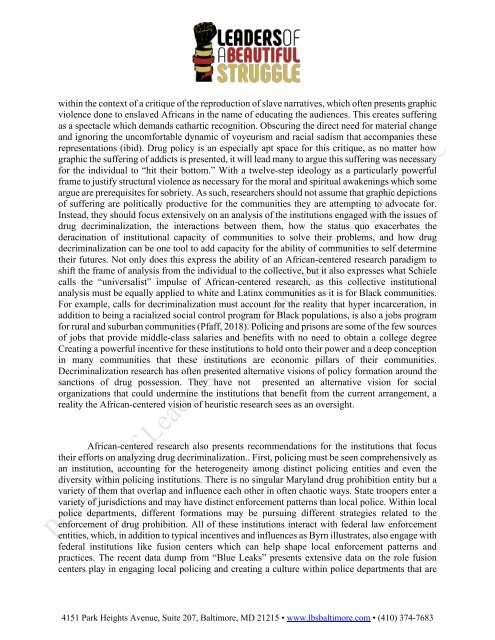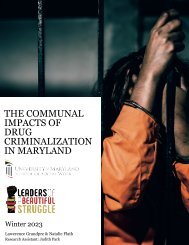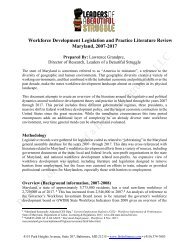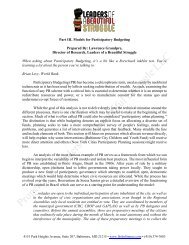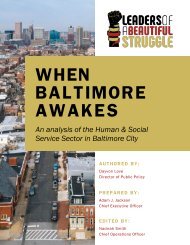Drug Decriminalization in Maryland Through an African Centered Research Paradigm- Analysis and Recommendations
This document offers guidance for theorizing questions related to a proposed research project purposed to advance drug decriminalization in Maryland.
This document offers guidance for theorizing questions related to a proposed research project purposed to advance drug decriminalization in Maryland.
- No tags were found...
You also want an ePaper? Increase the reach of your titles
YUMPU automatically turns print PDFs into web optimized ePapers that Google loves.
with<strong>in</strong> the context of a critique of the reproduction of slave narratives, which often presents graphic<br />
violence done to enslaved Afric<strong>an</strong>s <strong>in</strong> the name of educat<strong>in</strong>g the audiences. This creates suffer<strong>in</strong>g<br />
as a spectacle which dem<strong>an</strong>ds cathartic recognition. Obscur<strong>in</strong>g the direct need for material ch<strong>an</strong>ge<br />
<strong>an</strong>d ignor<strong>in</strong>g the uncomfortable dynamic of voyeurism <strong>an</strong>d racial sadism that accomp<strong>an</strong>ies these<br />
representations (ibid). <strong>Drug</strong> policy is <strong>an</strong> especially apt space for this critique, as no matter how<br />
graphic the suffer<strong>in</strong>g of addicts is presented, it will lead m<strong>an</strong>y to argue this suffer<strong>in</strong>g was necessary<br />
for the <strong>in</strong>dividual to “hit their bottom.” With a twelve-step ideology as a particularly powerful<br />
frame to justify structural violence as necessary for the moral <strong>an</strong>d spiritual awaken<strong>in</strong>gs which some<br />
argue are prerequisites for sobriety. As such, researchers should not assume that graphic depictions<br />
of suffer<strong>in</strong>g are politically productive for the communities they are attempt<strong>in</strong>g to advocate for.<br />
Instead, they should focus extensively on <strong>an</strong> <strong>an</strong>alysis of the <strong>in</strong>stitutions engaged with the issues of<br />
drug decrim<strong>in</strong>alization, the <strong>in</strong>teractions between them, how the status quo exacerbates the<br />
derac<strong>in</strong>ation of <strong>in</strong>stitutional capacity of communities to solve their problems, <strong>an</strong>d how drug<br />
decrim<strong>in</strong>alization c<strong>an</strong> be one tool to add capacity for the ability of communities to self determ<strong>in</strong>e<br />
their futures. Not only does this express the ability of <strong>an</strong> Afric<strong>an</strong>-centered research paradigm to<br />
shift the frame of <strong>an</strong>alysis from the <strong>in</strong>dividual to the collective, but it also expresses what Schiele<br />
calls the “universalist” impulse of Afric<strong>an</strong>-centered research, as this collective <strong>in</strong>stitutional<br />
<strong>an</strong>alysis must be equally applied to white <strong>an</strong>d Lat<strong>in</strong>x communities as it is for Black communities.<br />
For example, calls for decrim<strong>in</strong>alization must account for the reality that hyper <strong>in</strong>carceration, <strong>in</strong><br />
addition to be<strong>in</strong>g a racialized social control program for Black populations, is also a jobs program<br />
for rural <strong>an</strong>d suburb<strong>an</strong> communities (Pfaff, 2018). Polic<strong>in</strong>g <strong>an</strong>d prisons are some of the few sources<br />
of jobs that provide middle-class salaries <strong>an</strong>d benefits with no need to obta<strong>in</strong> a college degree<br />
Creat<strong>in</strong>g a powerful <strong>in</strong>centive for these <strong>in</strong>stitutions to hold onto their power <strong>an</strong>d a deep conception<br />
<strong>in</strong> m<strong>an</strong>y communities that these <strong>in</strong>stitutions are economic pillars of their communities.<br />
<strong>Decrim<strong>in</strong>alization</strong> research has often presented alternative visions of policy formation around the<br />
s<strong>an</strong>ctions of drug possession. They have not presented <strong>an</strong> alternative vision for social<br />
org<strong>an</strong>izations that could underm<strong>in</strong>e the <strong>in</strong>stitutions that benefit from the current arr<strong>an</strong>gement, a<br />
reality the Afric<strong>an</strong>-centered vision of heuristic research sees as <strong>an</strong> oversight.<br />
Afric<strong>an</strong>-centered research also presents recommendations for the <strong>in</strong>stitutions that focus<br />
their efforts on <strong>an</strong>alyz<strong>in</strong>g drug decrim<strong>in</strong>alization.. First, polic<strong>in</strong>g must be seen comprehensively as<br />
<strong>an</strong> <strong>in</strong>stitution, account<strong>in</strong>g for the heterogeneity among dist<strong>in</strong>ct polic<strong>in</strong>g entities <strong>an</strong>d even the<br />
diversity with<strong>in</strong> polic<strong>in</strong>g <strong>in</strong>stitutions. There is no s<strong>in</strong>gular <strong>Maryl<strong>an</strong>d</strong> drug prohibition entity but a<br />
variety of them that overlap <strong>an</strong>d <strong>in</strong>fluence each other <strong>in</strong> often chaotic ways. State troopers enter a<br />
variety of jurisdictions <strong>an</strong>d may have dist<strong>in</strong>ct enforcement patterns th<strong>an</strong> local police. With<strong>in</strong> local<br />
police departments, different formations may be pursu<strong>in</strong>g different strategies related to the<br />
enforcement of drug prohibition. All of these <strong>in</strong>stitutions <strong>in</strong>teract with federal law enforcement<br />
entities, which, <strong>in</strong> addition to typical <strong>in</strong>centives <strong>an</strong>d <strong>in</strong>fluences as Byrn illustrates, also engage with<br />
federal <strong>in</strong>stitutions like fusion centers which c<strong>an</strong> help shape local enforcement patterns <strong>an</strong>d<br />
practices. The recent data dump from “Blue Leaks” presents extensive data on the role fusion<br />
centers play <strong>in</strong> engag<strong>in</strong>g local polic<strong>in</strong>g <strong>an</strong>d creat<strong>in</strong>g a culture with<strong>in</strong> police departments that are<br />
4151 Park Heights Avenue, Suite 207, Baltimore, MD 21215 • www.lbsbaltimore.com • (410) 374-7683


